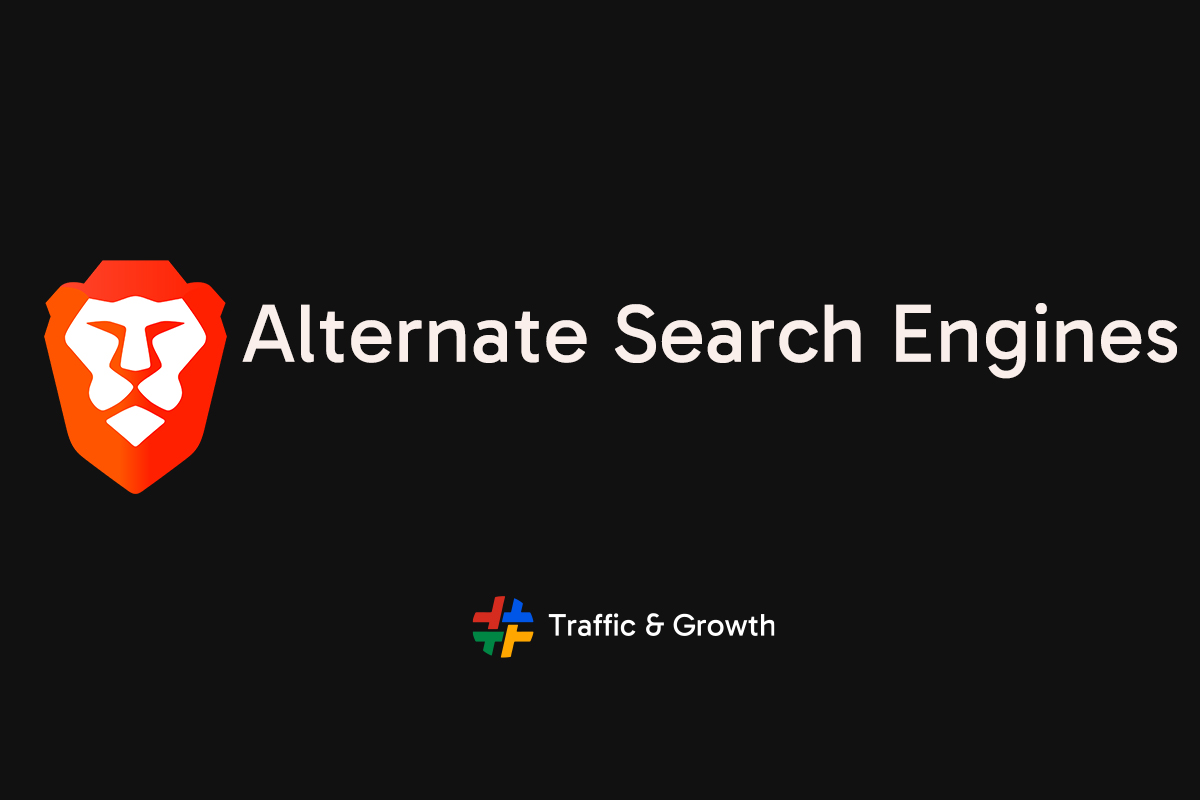Alternative search engines have been gaining popularity in recent years as people become increasingly concerned about their online privacy and the amount of data that large search engines like Google and Bing collect. While Google remains the dominant player in the search engine market, there are many other options available to users who are looking for a different search experience.
One of the main reasons why people choose to use alternative search engines is because they offer increased privacy and security. Many of these search engines do not track user activity or collect personal data, which can be a major concern for those who value their privacy. Additionally, some alternative search engines also offer unique features that are not available on larger search engines, such as the ability to search for content on the dark web or to search for content in specific languages.
Despite the benefits of using alternative search engines, it is important to note that they may not always provide the same level of accuracy or comprehensiveness as larger search engines like Google. However, for those who are looking for a different search experience or who are concerned about their online privacy, alternative search engines can be a valuable tool. In the following sections, we will explore some of the best alternative search engines currently available and highlight their unique features and benefits.
What are Alternate Search Engines?
Definition
Alternate search engines are non-Google search engines that provide an alternative to Google’s search engine. These search engines work by indexing web pages on the internet and providing users with relevant search results based on their search queries. They are designed to provide users with more privacy, security, and control over their search results.
Examples
There are many alternate search engines available for users to choose from. Some popular examples include:
- Bing: Microsoft’s Bing search engine is the second-largest search engine after Google. It provides a more visual experience with beautiful daily background photos and is easy to use.
- Yahoo: Yahoo is a popular web portal with a search engine powered by Bing.
- Ecosia: Ecosia is a search engine that plants trees with its ad revenue. It is a great option for environmentally conscious users.
- Swisscows: Swisscows is a privacy-focused search engine that does not track user data or store search history.
- Ask: Ask is a question-answering search engine that provides users with answers to their questions in addition to search results.
- Brave: Brave is a privacy-focused web browser that includes a built-in search engine that does not track user data or store search history.
- Gibiru: Gibiru is a privacy-focused search engine that does not track user data or store search history.
- Yandex: Yandex is a Russian search engine that provides users with relevant search results based on their search queries.
- Searx: Searx is an open-source search engine that allows users to customize their search results and protect their privacy.
- Metager: Metager is a privacy-focused search engine that does not track user data or store search history.
- Mojeek: Mojeek is a privacy-focused search engine that does not track user data or store search history.
- Neeva: Neeva is an ad-free search engine that provides users with relevant search results based on their search queries.
- Naver: Naver is a South Korean search engine that provides users with relevant search results based on their search queries.
- Infinity Search: Infinity Search is a privacy-focused search engine that does not track user data or store search history.
Overall, alternate search engines provide users with more privacy, security, and control over their search results. Users can choose from a wide range of options depending on their preferences and needs.
Why Use Alternate Search Engines?
Alternate search engines offer users a range of benefits that are not always available with mainstream search engines like Google. These benefits include privacy, user experience, and access to specific resources. In this section, we will explore each of these benefits in more detail.
Privacy
One of the main reasons people use alternate search engines is for increased privacy. Mainstream search engines like Google are known to track user data, including search history, browsing history, and IP addresses. This data is often used for targeted advertising, and it can be sold to third-party advertisers.
Private search engines, on the other hand, do not track user data and offer anonymous browsing options. They use encryption and other security features to protect user data and browsing history. Users can search the web without worrying about being tracked or having their data sold to advertisers.
User Experience
Alternate search engines offer a range of user experience features that are not always available with mainstream search engines. For example, visual search engines allow users to search for images and videos using visual cues instead of text. This can be particularly useful for users who are looking for specific types of images or videos.
Some search engines also offer anonymous view options that allow users to view websites without leaving a trace of their browsing history. This can be useful for users who are researching sensitive topics or who do not want their browsing history to be tracked.
Resources
Alternate search engines offer access to specific resources that are not always available with mainstream search engines. For example, some search engines specialize in format-specific results, such as GIPHY and YouTube. Other search engines support social causes and welfare, such as Ecosia, which donates a portion of their ad revenue to planting trees.
In addition, some search engines offer unbiased results, which can be useful for users who are looking for information on controversial or politically charged topics. These search engines use algorithms that are not influenced by political or commercial interests, allowing users to access information that is not filtered or censored.
In conclusion, alternate search engines offer a range of benefits that are not always available with mainstream search engines. These benefits include privacy, user experience, and access to specific resources. Users who are looking for increased privacy, specific user experience features, or access to specific resources may want to consider using an alternate search engine.
Popular Alternate Search Engines
In recent years, more and more people have become concerned about their privacy online. As a result, alternative search engines have become increasingly popular. These search engines offer users a way to search the web without having their data tracked and stored by big tech companies. Here are some of the most popular alternative search engines available today.
DuckDuckGo
DuckDuckGo is one of the most well-known alternative search engines. It promises to never track its users or store their personal information. The search engine also offers a feature called “bangs,” which allows users to quickly search specific websites by using a shortcut. For example, typing “!w” before a search query will search Wikipedia.
StartPage
StartPage is another privacy-focused search engine. It retrieves search results from Google but doesn’t track or store any user data. StartPage also offers a feature called “Anonymous View,” which allows users to browse websites without revealing their IP address.
Ecosia
Ecosia is a search engine that is focused on environmental sustainability. The company donates a portion of its profits to planting trees around the world. Ecosia retrieves search results from Bing but doesn’t track or store any user data.
Swisscows
Swisscows is a search engine that promises to never store any user data. It uses semantic technology to provide more accurate search results. Swisscows also offers a feature called “Answer Boxes,” which provides quick answers to common questions.
Brave Search
Brave Search is a search engine developed by the makers of the Brave browser. It promises to never track its users or store their personal information. Brave Search also offers a feature called “Goggles,” which allows users to preview search results without clicking on them.
Searx
Searx is an open-source search engine that retrieves search results from a variety of sources. It allows users to customize their search preferences and also offers a feature called “Instant Answers,” which provides quick answers to common questions.
Metager
Metager is a privacy-focused search engine developed in Germany. It retrieves search results from a variety of sources and doesn’t track or store any user data. Metager also offers a feature called “MetaGer Protect,” which blocks malicious websites and trackers.
Mojeek
Mojeek is a UK-based search engine that promises to never track its users or store their personal information. It uses its own index to provide search results and also offers a feature called “SafeSearch,” which filters out adult content.
Neeva
Neeva is a subscription-based search engine that promises to never show ads or sell user data. It retrieves search results from a variety of sources and also offers a feature called “Spaces,” which allows users to organize their search results into different categories.
Naver
Naver is a search engine developed in South Korea. It offers search results in multiple languages and also provides a variety of other services, such as email and news. Naver is one of the most popular search engines in South Korea.
Gibiru
Gibiru is a search engine that promises to provide uncensored search results. It retrieves search results from a variety of sources and doesn’t track or store any user data. Gibiru also offers a feature called “Proxy Browsing,” which allows users to browse websites anonymously.
Overall, these alternative search engines provide users with a way to search the web without having their data tracked and stored by big tech companies. Each search engine has its own unique features and benefits, so users should choose the one that best fits their needs.
Specialized Alternate Search Engines
Specialized alternate search engines are designed to cater to specific search needs of users. They offer a more focused search experience and can be a great alternative to Google for certain types of queries. In this section, we will explore some of the popular specialized alternate search engines.
Video Search
Video search engines are designed to search for videos across the web. While YouTube is the most popular video search engine, there are many other options available. Ecosia is an eco-friendly search engine that offers a video search feature. Swisscows is another search engine that offers a video search option along with its regular search functionality.
Image Search
Image search engines allow users to search for images on the internet. Google is the most popular image search engine, but there are other options available as well. Startpage is a privacy-focused search engine that offers a private image search feature. DuckDuckGo is another privacy-focused search engine that offers an image search option. Gibiru is a search engine that claims to offer uncensored image search results.
News
News search engines allow users to search for news articles from various sources. Bing and Yahoo are two popular search engines that offer a news search feature. Google also offers a news search feature, but it has been criticized for promoting fake news. Startpage is another search engine that offers a private news search feature.
Translation
Translation search engines allow users to translate text from one language to another. Google Translate is the most popular translation search engine, but there are other options available as well. Yandex Translate is a translation search engine that offers translations in over 100 languages. DeepL is another translation search engine that uses artificial intelligence to provide accurate translations.
Browsing History
Browsing history search engines allow users to search their browsing history for previously visited web pages. Infinity Search is a search engine that allows users to search their browsing history along with the internet. Internet Archive is another search engine that allows users to search for web pages that are no longer available on the internet.
In conclusion, specialized alternate search engines offer a more focused search experience for users. While Google is the most popular search engine, these specialized search engines can be a great alternative for specific search needs.
How to Choose an Alternate Search Engine
When it comes to choosing an alternate search engine, there are a few factors to consider. This section will explore some of the key considerations to help you make an informed decision.
Market Dominance
One important factor to consider when choosing an alternate search engine is market dominance. While Google dominates the search engine market, there are still several alternatives available. Bing, Yahoo, and You.com are all popular options, with Bing being the second largest search engine after Google. However, there are also smaller search engines like Ecosia, Neeva, Naver, and Gigablast that offer unique features and benefits.
Carbon Footprint
Another factor to consider is the carbon footprint of the search engine. Some search engines are more environmentally friendly than others. Ecosia, for example, is a search engine that plants trees with its ad revenue. It also runs on renewable energy and has a low carbon footprint. Neeva is another search engine that claims to be carbon neutral. On the other hand, some search engines like Google and Bing have a larger carbon footprint due to their massive data centers and energy consumption.
Rewards
Rewards are another consideration when choosing an alternate search engine. Some search engines offer rewards programs that allow users to earn points or other incentives for using their search engine. Bing Rewards, for example, allows users to earn points that can be redeemed for gift cards or other rewards. You.com is another search engine that offers rewards for using its platform. However, it’s important to note that some rewards programs may come with tracking cookies or other privacy concerns.
In summary, when choosing an alternate search engine, it’s important to consider factors such as market dominance, carbon footprint, and rewards programs. By weighing these factors, you can make an informed decision and choose a search engine that aligns with your values and priorities.
Conclusion
In conclusion, there are a variety of alternative search engines available for users who are concerned about privacy policies, tracking cookies, and user data. Some of the most popular privacy-focused search engines include DuckDuckGo, Brave Search, and Startpage. These search engines prioritize user privacy by not tracking user data or search history.
For users who are concerned about the accuracy of search results, WolframAlpha is a powerful computational knowledge engine that provides answers to questions in a variety of fields, including mathematics, science, and history. This search engine is particularly useful for academic research or data analysis.
OneSearch is another alternative search engine that prioritizes user privacy by encrypting search queries and not tracking user data. Boardreader is a search engine that specializes in forums and online discussions, making it a useful tool for users who are looking for information on specific topics or products.
Finally, Twitter can be used as a search engine for real-time news and updates on current events. While Twitter does track user data, it can be a useful tool for users who are looking for up-to-date information on breaking news or trending topics.
Overall, users have a variety of alternative search engines available to them, each with its own strengths and weaknesses. It is important for users to evaluate their own needs and priorities when selecting a search engine and to carefully review the privacy policies of any search engine they choose to use.








